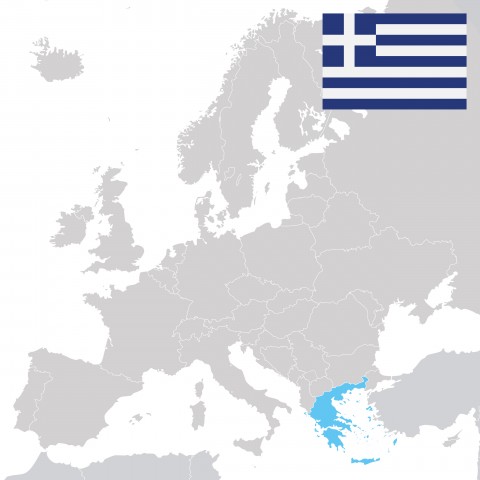
In the Greek language, an adverb is an uninflected part of speech, which normally modifies a verb. However, adverbs can also modify adjectives, nouns, and even entire phrases.
The good news is that these Greek adverbs remain unchanged, regardless of the case, the number, the tense, or any other grammatical phenomenon. And in Greek, where most parts of speech get inflected, this is definitely an assurance.
The bad news—if any—is that there’s a wide variety of adverbs, and it’s nearly impossible for a novice Greek learner to study all of them.
In this blog post, we’ll guide you through learning the top 100 most common Greek adverbs, along with useful examples of their use.
First of all, Greek adverbs are divided into five distinct categories:
- Temporal adverbs. These denote time and frequency, and answer the question “When?”
- Locative adverbs. These denote place, and answer the question “Where?”
- Qualitative adverbs. These denote manner and answer the question “How?”
- Quantitative adverbs. These denote quantity, and answer the question “How much?”
- Modal adverbs. These denote how certain we are about something through confirmation, hesitation, or negation.
Now, let’s have a look at each of the aforementioned categories in detail. Without further ado, our Greek adverbs list!
 Table of Contents
Table of Contents
1. Temporal Adverbs

If you’re wondering “When?”, then the first answer that will probably pass through your mind is an adverb.
In Greek, Πότε; (Pόte?), meaning “When?”, is a very common question in everyday life. From arranging a business appointment to asking for transportation information, temporal adverbs will surely come in handy.
| 1 | Greek: σήμερα Romanization: símera Translation: “today” | Example: Greek: Σήμερα δεν κάνει τόσο κρύο. Romanization: Símera den káni tóso krío. Translation: “Today is not that cold.” |
| 2 | Greek: αύριο Romanization: ávrio Translation: “tomorrow” | Example: Greek: Θα πάμε για ψώνια αύριο. Romanization: Tha páme ya psónia ávrio. Translation: “We’ll go shopping tomorrow.” |
| 3 | Greek: μεθαύριο Romanization: methávrio Translation: “the day after tomorrow” | Example: Greek: Εάν δεν μπορείς αύριο, πάμε μεθαύριο. Romanization: Εán den borís ávrio, páme methávrio. Translation: “If you can’t tomorrow, let’s go on the day after tomorrow.” |
| 4 | Greek: χθες Romanization: hthes Translation: “yesterday” | Example: Greek: Χθες ήμουν άρρωστη, αλλά σήμερα είμαι καλύτερα. Romanization: Hthes ímun árrosti, alá símera íme kalítera. Translation: “Yesterday I was sick, but today I’m better.” |
| 5 | Greek: τώρα Romanization: tóra Translation: “now” | Example: Greek: Δεν γίνεται να μιλήσουμε τώρα, γιατί είμαι απασχολημένος. Romanization: Den yínete na milísume tóra, yiatí íme apasholiménos. Translation: “We can’t talk now because I am busy.” |
| 6 | Greek: αργότερα Romanization: argótera Translation: “later” | Example: Greek: Παρακαλώ, προσπαθήστε ξανά αργότερα. Romanization: Parakaló, prospathíste xaná argótera. Translation: “Please, try again later.” |
| 7 | Greek: σύντομα Romanization: síndoma Translation: “shortly” / “soon” | Example: Greek: Θα λάβετε μια απάντηση σύντομα. Romanization: Tha lávete mia apándisi síndoma. Translation: “You’ll receive an answer shortly.” |
| 8 | Greek: τότε Romanization: tóte Translation: “then” | Example: Greek: Έλα το απόγευμα. Τότε θα έχω χρόνο. Romanization: Éla to apóyevma. Tóte tha ého hróno. Translation: “Come in the afternoon. I’ll have time then.” |
| 9 | Greek: αργά Romanization: argá Translation: “late” | Example: Greek: Δεν μπορώ να έρθω, γιατί είναι πολύ αργά. Romanization: Den boró na értho, yiatí íne polí argá. Translation: “I can’t come because it’s too late.” |
| 10 | Greek: νωρίς Romanization: norís Translation: “early” | Example: Greek: Κάθε μέρα ξυπνάω νωρίς το πρωί. Romanization: Káthe méra xipnáo norís to proí. Translation: “Every day, I wake up early in the morning.” |
| 11 | Greek: φέτος Romanization: fétos Translation: “this year” | Example: Greek: Φέτος ξεκίνησα να μαθαίνω ελληνικά. Romanization: Fétos xekínisa na mathéno eliniká. Translation: “This year, I began learning Greek.” |
| 12 | Greek: πέρυσι Romanization: périsi Translation: “last year” | Example: Greek: Πέρυσι ήταν η καλύτερη χρονιά της ζωής μου! Romanization: Périsi ítan i kalíteri hroniá tis zoís mu! Translation: “Last year was the best year of my life!” |
| 13 | Greek: μόλις Romanization: mólis Translation: “as soon as” | Example: Greek: Απάντησα στο μήνυμά σου μόλις το έλαβα. Romanization: Apánisa sto mínimá su mólis to élava. Translation: “I answered your message as soon as I got it.” |
| 14 | Greek: μετά Romanization: metá Translation: “after” | Example: Greek: Μπορούμε να πάμε για φαγητό μετά τη δουλειά. Τι λες; Romanization: Borúme na páme ya fayitó metá ti duliá. Ti les? Translation: “We can go for lunch after work. What do you say?” |
| 15 | Greek: πριν Romanization: prin Translation: “before” | Example: Greek: Θα σε πάρω τηλέφωνο πριν κοιμηθώ. Romanization: Tha se páro tiléfono prin kimithó. Translation: “I’ll call you before I go to sleep.” |
| 16 | Greek: απόψε Romanization: apópse Translation: “tonight” | Example: Greek: Απόψε είναι το πάρτι γενεθλίων μου. Romanization: Apópse íne to párti yenethlíon mu. Translation: “Tonight is my birthday party. |
| 17 | Greek: έγκαιρα / εγκαίρως Romanization: éngera / engéros Translation: “in time” | Example: Greek: Θα σε ειδοποιήσω εγκαίρως. Romanization: Tha se idopiíso engéros. Translation: “I’ll notify you in time.” |
| 18 | Greek: ξανά Romanization: xaná Translation: “again” This is often used as a verb prefix meaning “re-,” such as in “redo,” to denote an action being done again. | Example: Greek: Εάν δεν είναι σωστό, κάνε το ξανά (or ξανακάνε το). Romanization: Eán den íne sostó, káne to xaná (or xanakáne to). Translation: “If it’s not correct, do it again / redo it.” Useful expressions: Greek: Ξανά και ξανά. Romanization: Xaná ke xaná. Translation: “Over and over again.” Greek: Ποτέ ξανά! Romanization: Poté xaná! Translation: “Never again!” |
| 19 | Greek: πάλι Romanization: páli Translation: “again” It’s usually used when “again” implies the speaker’s frustration, but never as a verb prefix. | Example: Greek: Πάλι δεν έκανες τις ασκήσεις σου; Romanization: Páli den ékanes tis askísis su? Translation: “You haven’t done your homework again?” Useful expressions: Greek: Όχι πάλι! Romanization: Óhi páli! Translation: “Not again!” Greek: Άντε πάλι! Romanization: Áde páli! Translation: “There we go again!” |
| 20 | Greek: ήδη Romanization: ídi Translation: “already” | Example: Greek: Σε έχω συγχωρήσει ήδη πολλές φορές. Romanization: Se ého sinhorísi ídi polés forés. Translation: “I have already forgiven you many times.” |
1.1 Adverbs of Frequency
Another common time-related question is Πόσο συχνά; (Póso sihná?), meaning “How often?” The answer, in this case, regularly includes some of the following adverbs in Greek.
| 21 | 22 | 23 | 24 | 25 |
| Greek: ποτέ Romanization: poté Translation: “never” | Greek: σπάνια / σπανίως Romanization: spánia / spaníos Translation: “rarely” | Greek: συχνά Romanization: sihná Translation: “often” | Greek: συνήθως Romanization: siníthos Translation: “usually” | Greek: πάντα Romanization: páda Translation: “always” |
You may encounter the above adverbs in questionnaires, so they are really useful.
Another adverb of frequency is:
| 26 | Greek: διαρκώς Romanization: diarkós Translation: “constantly” | Example: Greek: Σταμάτα! Με ενοχλείς διαρκώς. Romanization: Stamáta! Me enohís diarkós. Translation: “Stop it! You are constantly bothering me.” |
When it comes to the cost of a service, the following adverbs are usually used to determine payment methods.
| 27 | 28 | 29 | 30 | 31 | 32 |
| Greek: ωριαίως Romanization: oriéos Translation: “hourly” | Greek: ημερησίως Romanization: imerisíos Translation: “daily” / “on a daily basis” | Greek: καθημερινά / καθημερινώς Romanization: kathimeriná / kathimerinós Translation: “daily” / “every day” | Greek: εβδομαδιαίως Romanization: evdomadiéos Translation: “weekly” | Greek: μηνιαίως Romanization: miniéos Translation: “monthly” | Greek: ετησίως Romanization: etisíos Translation: “annually” |
For example:
Greek: Για την υπηρεσία αυτή θα χρεωθείτε ωριαίως / ημερησίως / εβδομαδιαίως / μηνιαίως / ετησίως .
Romanization: Ya tin ipiresía aftí tha hreothíte oriéos / imerisíos / evdomadiéos / miniéos / etisíos.
Translation: “For this service, you will be charged hourly / daily / weekly / monthly / annually.”
2. Locative Adverbs
In this category fall the adverbs answering the question Πού; (Pu?), or “Where?”

| 33 | Greek: εδώ Romanization: edó Translation: “here” | Example: Greek: Έλα εδώ. Θέλω να σου πω κάτι. Romanization: Éla edó. Thélo na su po káti. Translation: “Come here. I want to tell you something.” |
| 34 | Greek: εκεί Romanization: ekí Translation: “there” | Example: Greek: Βλέπεις το μεγάλο βουνό εκεί; Ονομάζεται Όλυμπος. Romanization: Vlépis to megálo vunó ekí? Onomázete Ólimbos. Translation: “Do you see that big mountain over there? It’s called Olympus.” |
| 35 | Greek: παντού Romanization: pandú Translation: “everywhere” | Example: Greek: Στo νησί βλέπεις χαμογελαστούς ανθρώπους παντού. Romanization: Sto nisí vlépis hamoyelastús anthrópus pandú. Translation: “On the island, you can see smiling people everywhere.” |
| 36 | Greek: κάπου Romanization: kápu Translation: “somewhere” | Example: Greek: Έχασα το κινητό μου. Κάπου πρέπει να το ξέχασα. Romanization: Éhasa to kinitó mu. Kápu prépi na to xéhasa. Translation: “I have lost my mobile phone. I must have forgotten it somewhere.” |
| 37 | Greek: πουθενά Romanization: puthená Translation: “nowhere” / “somewhere” (in questions) | Examples: Greek: Δεν μπορώ να το βρω πουθενά. Romanization: Den boró na to vro puthená. Translation: “I can’t find it anywhere.” Greek: Είδες πουθενά τα κλειδιά μου; Romanization: Ídes puthená ta klidiá mu? Translation: “Did you see my keys somewhere?” |
| 38 | Greek: μέσα Romanization: mésa Translation: “inside” / “in” / “within” | Examples: Greek: Έψαξα μέσα και έξω από το σπίτι. Romanization: Épsaxa mésa ke éxo apó to spíti. Translation: “I searched inside and outside the house.” Greek: Το ασανσέρ χάλασε, γιατί πηγαίνει πάνω κάτω χωρίς σταματημό όλη μέρα. Romanization: To asansér hálase, yatí piyéni páno káto horís stamatimó óli méra. Translation: “The elevator broke down because it goes up and down without stopping all day long.” Greek: Όταν περνάω τον δρόμο, κοιτάω δεξιά και αριστερά. Romanization: Ótan pernáo ton drómo, kitáo dexiá ke aristerá. Translation: “When I cross the street, I look right and left.” |
| 39 | Greek: έξω Romanization: éxo Translation: “outside” / “out” | |
| 40 | Greek: πάνω Romanization: páno Translation: “up” / “over” / “on” | |
| 41 | Greek: κάτω Romanization: káto Translation: “down” / “under” / “beneath” | |
| 42 | Greek: δεξιά Romanization: dexiá Translation: “right” | |
| 43 | Greek: αριστερά Romanization: aristerá Translation: “left” |
| 44 | Greek: δίπλα Romanization: dípla Translation: “next to” / “nearby” | Examples: Greek: Το ξενοδοχείο είναι δίπλα στην τράπεζα. Romanization: To xenodohío íne dípla stin trápeza. Translation: “The hotel is next to the bank.” Greek: Το ξενοδοχείο είναι εδώ δίπλα. Romanization: To xenodohío íne edó dípla. Translation: “The hotel is nearby.” Greek: Ο Γιάννης είναι δίπλα μου. Romanization: O Yánis íne dípla mu. Translation: “John is next to me.” |
| 45 | Greek: μακριά Romanization: makriá Translation: “far” | Example: Greek: Το σπίτι μου δεν είναι μακριά από το κέντρο της πόλης. Romanization: To spíti mu den íne makriá apó to kédro tis pólis. Translation: “My home is not far from the city center.” |
| 46 | Greek: κοντά Romanization: kondá Translation: “near” | Example: Greek: Το σπίτι μου είναι κοντά στη θάλασσα. Romanization: To spíti mu íne kondá sti thálasa. Translation: “My home is near the sea.” |
| 47 | Greek: απέναντι Romanization: apénandi Translation: “across” | Example: Greek: Απέναντι από το ξενοδοχείο βρίσκεται ένα καλό εστιατόριο. Romanization: Apénandi apó to xenodohío vrískete éna kaló estiatório. Translation: “Across from the hotel, there’s a good restaurant.” |
| 48 | Greek: πίσω Romanization: píso Translation: “behind” / “back” | Example: Greek: Πίσω από το φαρμακείο βρίσκεται ένα ιδιωτικό πάρκινγκ. Romanization: Píso apó to farmakío vrískete éna idiotikó párking. Translation: “Behind the pharmacy, there’s private parking.” |
| 49 | Greek: μπροστά Romanization: brostá Translation: “in front of” | Example: Greek: Μπροστά από το σχολείο βρίσκεται ένα όμορφο πάρκο. Romanization: Brostá apó to scholío vrískete éna ómorfo párko. Translation: “In front of the school, there’s a beautiful park.” |
| 50 | Greek: ψηλά Romanization: psilá Translation: “(up) high” | Example: Greek: Κοίταξα ψηλά στον ουρανό και είδα ένα εξωτικό πουλί. Romanization: Κítaxa psilá ston uranó ke ída éna exotikó pulí. Translation: “I looked high up in the sky and I saw an exotic bird.” |
| 51 | Greek: χαμηλά Romanization: hamilá Translation: “(down) low” | Example: Greek: Κοίταξα χαμηλά και είδα ένα μικρό γατάκι στο πεζοδρόμιο. Romanization: Κítaxa hamilá ke ída éna gatáki sto pezodrómio. Translation: “I looked down low and I saw a kitty on the pavement.” |
| 52 | Greek: μεταξύ Romanization: metaxí Translation: “between” This is followed by a noun in genitive case, as demonstrated in the example. | Example: Greek: Μεταξύ των δύο σπιτιών υπήρχε ένας φράχτης. Romanization: Metaxí ton dío spitión ipírhe énas fráhtis. Translation: “Between the two houses, there was a fence.” |
| 53 | Greek: ανάμεσα Romanization: anámesa Translation: “between” This adverb is followed by the preposition σε, which is often integrated in the article, becoming στον (masculine) / στη(ν) (feminine) / στο (neutral). | Example: Greek: Ανάμεσα στα δύο σπίτια υπήρχε ένας φράχτης. Romanization: Anámesa sta dío spítia ipírhe énas fráhtis. Translation: “Between the houses, there was a fence.” |
| 54 | Greek: γύρω Romanization: yíro Translation: “around” | Example: Greek: Γύρω από το δέντρο υπήρχαν πολλές μέλισσες. Romanization: Υíro apó to déndro ipírhan polés mélises. Translation: “Around the tree, there were many bees.” |
| 55 | Greek: αλλού Romanization: alú Translation: “someplace else” / “somewhere else” | Example: Greek: Αυτό το εστιατόριο είναι γεμάτο. Πάμε αλλού. Romanization: Aftó to estiatório íne yemáto. Páme alú. Translation: “This restaurant is full. Let’s go someplace else.” |
| 56 | Greek: βόρεια Romanization: vória Translation: “north” | Example: Greek: Η Ελλάδα είναι ένα σταυροδρόμι πολιτισμών. Ανατολικά συνορεύει με την Τουρκία, δυτικά με την Ιταλία, βόρεια με τη Βουλγαρία, βορειοδυτικά με την Αλβανία και νότια με την Αφρική. Romanization: I Elláda íne éna stavrodrómi politizmón. Anatoliká sinorévi me tin Turkía, ditiká me tin Italía, vória me ti Vulgaría, vorioditiká me tin Alvanía ke nótia me tin Afrikí. Translation: “Greece is a crossroad of cultures. It borders Turkey to the east, Italy to the west, Bulgaria to the north, Albania to the northwest, and Africa to the south.” |
| 57 | Greek: νότια Romanization: nótia Translation: “south” | |
| 58 | Greek: ανατολικά Romanization: anatoliká Translation: “east” | |
| 59 | Greek: δυτικά Romanization: ditiká Translation: “west” | |
| 60 | Greek: βορειοδυτικά Romanization: ditiká Translation: “southwest” |
If you want to learn more phrases about giving directions in Greek, we highly recommend that you check out our relevant blog post.
3. Qualitative Adverbs
Similarly, the adverbs of this category answer the question Πώς; (Pos?), meaning “How?”

| 61 | Greek: αργά Romanization: argá Translation: “slowly” | Example: Greek: Οδηγάς πολύ γρήγορα. Πήγαινε πιο αργά. Romanization: Odigás polí grígora. Píyene pio argá. Translation: “You are driving very quickly. Go more slowly.” |
| 62 | Greek: γρήγορα Romanization: grígora Translation: “quickly” |
| 63 | Greek: προσεκτικά Romanization: prosektiká Translation: “carefully” | Example: Greek: Να μη διαβάζεις απρόσεκτα. Να διαβάζεις προσεκτικά, για να καταλαβαίνεις. Romanization: Na mi diavázis aprósekta. Na diavázis prosektiká, ya na katalavénis. Translation: “You shouldn’t study without paying attention. You should study carefully in order to understand.” |
| 64 | Greek: απρόσεκτα Romanization: aprósekta Translation: “carelessly” / “without paying attention” |
| 65 | Greek: ήσυχα Romanization: ísiha Translation: “quietly” | Example: Greek: Το βράδυ προσπαθώ να μπαίνω στο σπίτι ήσυχα, για να μη σε ξυπνήσω. Romanization: To vrádi prospathó na béno sto spíti ísiha, ya na mi se xipníso. Translation: “During the night, I try to enter the house quietly so I won’t wake you up.” |
| 66 | Greek: χαρούμενα Romanization: harúmena Translation: “happily” | Example: Greek: Ο σκύλος με κοιτά χαρούμενα όταν έρχομαι στο σπίτι και λυπημένα όταν φεύγω. Romanization: O skílos me kitá harúmena ótan érhome sto spíti ke lipiména ótan févgo. Translation: “The dog looks at me happily when I come home and sadly when I leave.” |
| 67 | Greek: λυπημένα Romanization: lipiména Translation: “sadly” |
| 68 | Greek: εύκολα Romanization: éfkola Translation: “easily” | Example: Greek: Μπορείς να μπεις εύκολα σε έναν λαβύρινθο, όμως βγαίνεις δύσκολα. Romanization: Borís na bis éfkola se énan lavírintho, ómos vyénis dískola. Translation: “You can enter a labyrinth easily, but you get out of it with difficulty.” |
| 69 | Greek: δύσκολα Romanization: dískola Translation: “with difficulty” |
| 70 | Greek: κυριολεκτικά Romanization: kiriolektiká Translation: “literally” | Example: Greek: Αυτό το είπα μεταφορικά. Δεν μιλούσα κυριολεκτικά. Romanization: Aftó to ípa metaforiká. Den milúsa kiriolektiká. Translation: “I said this metaphorically. I wasn’t talking literally.” |
| 71 | Greek: μεταφορικά Romanization: metaforiká Translation: “metaphorically” |
| 72 | Greek: έτσι Romanization: étsi Translation: “this/that way” “like this/that” | Example: Greek: —Πώς θέλετε να σας κόψω τα μαλλιά; —Έτσι. Romanization: —Pós thélete na sas kópso ta maliá? —Étsi. Translation: “—How would you like me to cut your hair? —This way.” |
| 73 | Greek: κάπως Romanization: kápos Translation: “somehow” | Example: Greek: Κάπως πρέπει να συναντηθούμε. Romanization: Κápos prépi na sinadithúme. Translation: “We have to meet somehow.” |
| 74 | Greek: καλά / καλώς Romanization: kalá / kalós Translation: “well” / “good” | Example: Greek: —Το ραντεβού σας είναι αύριο το απόγευμα. —Καλώς. Romanization: —To randevú sas íne ávrio to apóyevma. —Kalós. Translation: “Your appointment is for tomorrow afternoon. – Good.” |
| 75 | Greek: κακά / κακώς Romanization: kaká / kakós Translation: “badly” / “bad” | Example: Greek: Κακώς δεν του είπες ότι θα αργήσεις. Romanization: Kakós den tu ípes óti tha aryísis. Translation: “It was bad that you didn’t tell him you’ll be late.” |
| 76 | Greek: ξαφνικά Romanization: xafniká Translation: “suddenly” | Example: Greek: Ξαφνικά ο ουρανός σκοτείνιασε και άρχισε να βρέχει. Romanization: Χafniká o uranós skotíniase ke árhise na vréhi. Translation: “Suddenly, the sky darkened and it started raining.” |
| 77 | Greek: ωραία Romanization: oréa Translation: ” nicely” / “nice” | Example: Greek: Αυτή τη φορά πέρασα πολύ ωραία στην εκδρομή μας. Την προηγούμενη φορά ήμουν άρρωστος και πέρασα πολύ άσχημα. Romanization: Aftí ti forá pérasa polí oréa stin ekdromí mas. Tin proigúmeni forá ímun árostos ke pérasa polí áshima. Translation: “This time, I had a nice time on our excursion. Last time, I was sick and I had a bad time.” |
| 78 | Greek: άσχημα Romanization: áshima Translation: “badly” / “bad” |
| 79 | Greek: μαζί Romanization: mazí Translation: “together” | Example: Greek: Πήγατε μαζί σινεμά; Romanization: Pígate mazí sinemá? Translation: “Did you go to the cinema together?” |
| 80 | Greek: ευτυχώς Romanization: eftihós Translation: “fortunately” / “luckily” | Example: Greek: Ευτυχώς η άσκηση ήταν εύκολη, όμως δεν πρόλαβα να την κάνω δυστυχώς. Romanization: Eftihós i áskisi ítan éfkoli, ómos den prólava na tin káno distihós. Translation: “Fortunately, the assignment was easy; but unfortunately, I didn’t get it done. “ |
| 81 | Greek: δυστυχώς Romanization: distihós Translation: “unfortunately” |
4. Quantitative Adverbs
As you might have guessed, adverbs of quantity answer the question Πόσο; (Póso), or “How much?”

Here are some of the most popular answers:
| 82 | 83 | 84 | 85 | 86 | 87 | 88 |
| Greek: τόσο Romanization: tóso Translation: “that much“ | Greek: λίγο Romanization: lígo Translation: “(a) little” | Greek: πολύ Romanization: polí Translation: “very” / “much” / “too” | Greek: αρκετά Romanization: arketá Translation: “enough” | Greek: λιγότερο Romanization: ligótero Translation: “less” | Greek: περισσότερο Romanization: perisótero Translation: “more” | Greek: καθόλου Romanization: kathólu Translation: “(not) at all” |
Now, let’s have a look at some more adverbs of quantity, along with some examples.+
| 89 | Greek: μόνο Romanization: móno Translation: “only” / “just” This adverb is usually accompanied by other relevant adverbs of quantity, such as τόσο (tóso) and λίγο (lígo). | Example: Greek: Έφαγα λίγο μόνο και δεν χόρτασα. Romanization: Éfaga lígo móno ke den hórtasa. Translation: “I ate just a little and I didn’t get full.” |
| 90 | Greek: περίπου Romanization: perípu Translation: “approximately” / “about” This adverb is usually accompanied by other relevant adverbs of quantity, such as τόσο (tóso). | Example: Greek: Έφαγα τόσο περίπου και δεν χόρτασα. Romanization: Éfaga tóso perípu ke den hórtasa. Translation: “I ate about that much and I didn’t get full.” (while demonstrating the quantity) |
| 91 | Greek: σχεδόν Romanization: shedón Translation: “almost” / “nearly” This adverb is usually accompanied by other relevant adverbs of quantity, such as τόσο (tóso). | Example: Greek: Έφαγε σχεδόν όλα τα μπισκότα. Romanization: Éfaye schedón óla ta biskóta. Translation: “He ate almost all the cookies.” |
5. Modal Adverbs
Adverbs denoting confirmation, hesitation, or negation typically answer Yes/No questions, or they can be used to express agreement or disagreement in general.

5.1 Confirmation Adverbs
| 92 | 93 | 94 | 95 |
| Greek: ναι Romanization: ne Translation: “yes” | Greek: σίγουρα Romanization: sígura Translation: “surely” / “for sure” | Greek: βέβαια / βεβαίως Romanization: vévea / vevéos Translation: “certainly” | Greek: μάλιστα Romanization: málista Translation: “indeed” |
5.2 Hesitation Adverbs
| 96 | 97 |
| Greek: ίσως Romanization: ísos Translation: “maybe” | Greek: πιθανόν Romanization: pithanón Translation: “perhaps” / “probably” |
5.3 Negation Adverbs
| 98 | 99 | 100 |
| Greek: όχι Romanization: óhi Translation: “no” | Greek: δεν Romanization: den Translation: “not” (with a verb in the indicative mood) | Greek: μη(ν) Romanization: min Translation: “not” (with a verb in the subjunctive mood) |
6. Conclusion
Learning how to describe various actions is an integral part of your studies. In this article, we’ve tried to cover a wide range of modern Greek adverbs which will be useful in everyday life.
GreekPod101.com offers you high-quality, practical knowledge about the Greek language.
On GreekPod101.com, we aim to provide you with everything you need to know about the Greek language in a fun and interesting way. Stay tuned for more articles like this one, word lists, grammar tips, and even YouTube videos, which are waiting for you to discover them!
You can also upgrade to Premium PLUS and take advantage of our MyTeacher program to learn Greek with your own personal tutor, who will answer any questions you might have!
In the meantime, can you think of another adverb not included in this list? Let us know in the comments and we’ll surely inform you about its Greek equivalent!










